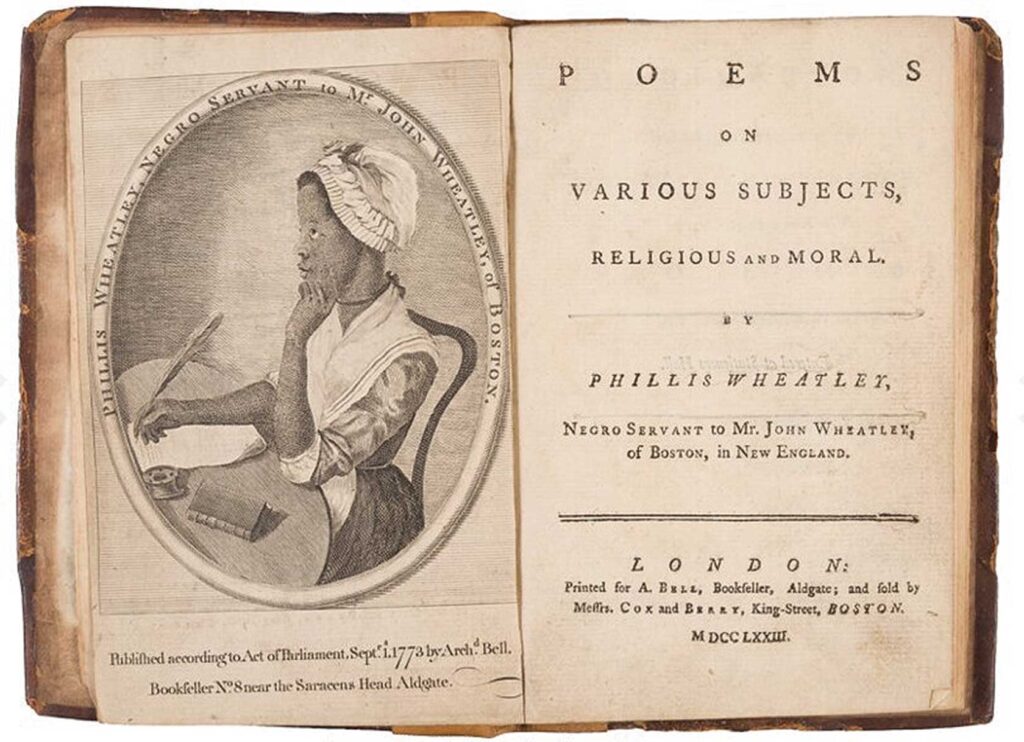First edition Phillis Wheatley poetry book acquired by Boston Tea Party Ships & Museum

This year marks the 250th anniversary of one of the most heralded revolutionary acts: the Boston Tea Party. Part of the celebration will include an unveiling by the Boston Tea Party Ships & Museum of its newest acquisition, a first-edition copy of Phillis Wheatley’s poetry book, “Poems on Various Subjects, Religious and Moral,” which arrived in Boston on one of the Boston Tea Party ships.
Phillis Wheatley was the first enslaved person and woman of African descent in the United States or Britain to publish a book. “Poems on Various Subjects” was her first published book and it came to Boston on the Dartmouth, from which Bostonians threw thousands of pounds of tea into the harbor on the night of Dec. 16, 1773. Fortunately, Wheatley’s volumes were unloaded before then and escaped harm.
It’s not just Wheatley’s literary prowess that makes her such a fascinating historical character.

The museum hosted a temporary exhibit of artistic reimaginings of Phillis Wheatley
by Boston-based Haitian American photographer Valerie Anselme. PHOTO: VALERIE ANSELME/©ANSELME PHOTOGRAPHY
“In her amazing capacity to learn, and the publishing of her books of poetry, she actually traveled to London, met with dignitaries like Benjamin Franklin, and had a very unique experience, and not a typical experience for an enslaved individual in Massachusetts at the time,” says Evan O’Brien, creative director at the Boston Tea Party Ships & Museum.
The organization acquired this first edition at an auction specializing in historical artifacts in Texas. It will be the cornerstone of a new permanent exhibition at the museum about Wheatley, and a way to make the history of the Tea Party more diverse and inclusive. That full exhibit can be expected in late 2024 or early 2025.

“Phillis Wheatley Reimagined,” by Valerie Anselme. The photography exhibit has moved to the Bruce C. Bolling Building in Nubian Square. PHOTO: VALERIE ANSELME/©ANSELME PHOTOGRAPHY
“We are thrilled to have secured this significant new acquisition of a first-edition copy of Phillis Wheatley’s famous book in this, the 250th Boston Tea Party anniversary year,” says Shawn P. Ford, vice president and executive director of the Boston Tea Party Ships & Museum.
In the meantime, the museum has hosted a temporary exhibition by Haitian American photographer Valerie Anselme depicting artistic interpretations of Wheatley during various stages of her life. That exhibition recently moved from the Boston Tea Party Ships & Museum to the Bruce C. Bolling Building in Nubian Square, where it’s on display for free for several months.
On Dec. 16, the official anniversary of the Boston Tea Party, there will be historical programming in Faneuil Hall and at the waterfront all day, culminating in a reenactment of the Tea Party. Phillis Wheatley will be one of the characters represented by actors on the waterfront speaking about equality and freedom.
“It’s very well known that there were people of color in Boston at the time, and they were just as much affected by the Boston Tea Party and the start of the American Revolution as everyone else in town,” says O’Brien. “It’s important to tell those stories of the often-underrepresented voices of people of color and especially women of Colonial America as well, to make the history as accessible to people from all over the world.”







